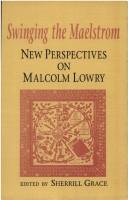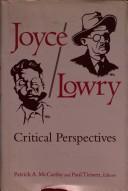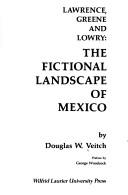| Listing 1 - 6 of 6 |
Sort by
|
Book

ISBN: 0776620878 9780776620879 9780776620886 0776620886 9780776620893 0776620894 9780776608020 0776608029 Year: 2013 Publisher: Ottawa, Ontario
Abstract | Keywords | Export | Availability | Bookmark
 Loading...
Loading...Choose an application
- Reference Manager
- EndNote
- RefWorks (Direct export to RefWorks)
An annotated scholarly edition including versions of the Malcolm Lowry novella that at different times was titled "The Last Address", "Swinging the Maelstrom" and "Lunar Caustic."
Psychiatric hospital patients --- Lowry, Malcolm, --- Lowry, Clarence Malcolm

ISBN: 0773508627 9786612855696 1282855697 0773563083 9780773563087 9780773508620 Year: 1992 Publisher: Montreal [Que.]
Abstract | Keywords | Export | Availability | Bookmark
 Loading...
Loading...Choose an application
- Reference Manager
- EndNote
- RefWorks (Direct export to RefWorks)
Sherrill Grace's introductory essay describes the influence of Lowry's work on artists working in other media. She also includes an important letter from Lowry to the Norwegian writer Nordahl Grieg, published here, with annotations, for the first time. Jan Gabrial, Lowry's first wife, provides an intimate glimpse of Lowry in a biographical story which has been out of print for more than forty years, Hallvard Dahlie documents the connection between Lowry and Nordahl Grieg, and David Falk conjures up an image of Lowry "groping his way through a labyrinth of paper" in an attempt to salvage himself and his texts. Christine Pagnoulle considers the major Volcano translations, Hilda Thomas astutely relates Volcano to contemporary politics and writing, and Frederick Asals provides a valuable study of the evolution of the Volcano manuscript. Joan Mulholland illustrates the centrality of speech acts in a Lowry text, Sue Vice successfully locates Lowry within the vanguard of post-modernism, and Donald Jewison links Lowry with Elias Canetti, Jorge Louis Borges, and Umberto Eco. Cynthia Sugars returns Lowry's Dark as a Grave to the critical limelight, Victor Doyen chronicles the extraordinary gestation of Lowry's final work, October Ferry to Gabriola, and Elsa Linguanti argues that the stories in Hear us O Lord from heaven thy dwelling place are among the best of Lowry's work. Suzanne Kim analyses his creative process and the significant "figures" within Lowry's poems and Mark Ellis Thomas makes a convincing case for the need for further study of Lowry's poetry. Graham Collier, a British jazz composer, discusses the compositional similarities between Lowry's texts and "free jazz"; Robert Kroetsch -- poet, novelist, and critic -- weaves the Lowry voice into his own "celebration of the anguish and ecstasy of creation." The suitability of Lowry's work to investigation by a variety of approaches and the array of international scholars who have contributed to this collection confirm Lowry's reputation as a major twentieth-century writer and make this book an exciting contribution to Lowry studies.
Lowry, Malcolm --- -Criticism and interpretation --- Lowry, Malcolm, --- Lowry, Clarence Malcolm --- Criticism and interpretation. --- English literature. --- British literature --- Inklings (Group of writers) --- Nonsense Club (Group of writers) --- Order of the Fancy (Group of writers) --- Lowry, Malcolm (1909-1957) --- Critique et interprétation
Book
ISBN: 0776623419 0776623400 0776623427 Year: 2016 Publisher: Ontario : University of Ottawa Press,
Abstract | Keywords | Export | Availability | Bookmark
 Loading...
Loading...Choose an application
- Reference Manager
- EndNote
- RefWorks (Direct export to RefWorks)
Malcolm Lowry's Poetics of Space offers a collection of exciting, new, and often controversial readings which seek to readdress not only Lowry's master work, Under the Volcano, but also many of his other writings.
Space in literature. --- Lowry, Malcolm, 1909-1957. --- Essays. --- Collected papers (Anthologies) --- Papers, Collected (Anthologies) --- Prose literature --- Festschriften --- Lowry, Malcolm, --- Lowry, Clarence Malcolm
Book
ISBN: 178962763X 1789621836 Year: 2020 Publisher: Liverpool : Liverpool University Press,
Abstract | Keywords | Export | Availability | Bookmark
 Loading...
Loading...Choose an application
- Reference Manager
- EndNote
- RefWorks (Direct export to RefWorks)
An Open Access edition of this book is available on the Liverpool University Press website and the OAPEN library. 'Who ever thought they would one day be able to read Malcolm Lowry's fabled novel of the 1930s and 40s, In Ballast to the White Sea? Lord knows, I didn't' - Michael Hofmann, TLS This book breaks new ground in studies of the British novelist Malcolm Lowry (1909-57), as the first collection of new essays produced in response to the publication in 2014 of a scholarly edition of Lowry's 'lost' novel, In Ballast to the White Sea. In their introduction, editors Helen Tookey and Bryan Biggs show how the publication of In Ballast sheds new light on Lowry as both a highly political writer and one deeply influenced by his native Merseyside, as his protagonist Sigbjørn Hansen-Tarnmoor walks the streets of Liverpool, wrestling with his own conscience and with pressing questions of class, identity and social reform. In the chapters that follow, renowned Lowry scholars and newer voice.
History Modern --- Lowry, Malcolm, --- Criticism and interpretation. --- World history --- Lowry, Clarence Malcolm --- Liverpool --- Bildungsroman --- communism --- modernism --- maritime writing

ISBN: 0813120020 1322597642 0813159393 9780813159393 9780813120027 Year: 1997 Publisher: Lexington, Ky University Press of Kentucky
Abstract | Keywords | Export | Availability | Bookmark
 Loading...
Loading...Choose an application
- Reference Manager
- EndNote
- RefWorks (Direct export to RefWorks)
While James Joyce was a central figure of high modernism, Malcom Lowry spoke for the next generation of modernist writers and, despite his denials, was almost certainly influenced by Joyce. Wherever the truth lies, there are correspondences and differences to be explored between Joyce and Lowry that are far more interesting than the question of direct influence. Despite numerous differences, their works have much in common: verbal richness, experimentation with narrative structure and perspective, a fascination with cultural and historical forces as well as with the process of artistic creatio
Comparative literature --- Lowry, Malcolm --- Joyce, James --- Modernism (Literature) --- -Modernism (Literature) --- -Joyce, James --- -Lowry, Malcolm --- -ジョイス --- Criticism and interpretation --- -Criticism and interpretation --- Joyce, James, --- Lowry, Malcolm, --- Lowry, Clarence Malcolm --- Criticism and interpretation. --- Dzhoĭs, Dzheĭms Avgustin Aloiziĭ, --- Džoiss, Džeimss, --- Gʻois, Gʻaims, --- Joyce, Giacomo, --- Jūyis, Jīms, --- Tzoys, Tzaiēms, --- Tzoys, Tzeēms, --- Джойс, Джеймс, --- Джойс, Джеймс Августин Алоїсуїс, --- Zhoĭs, Zheĭms, --- ג׳ויס, ג׳ײמס, --- ג׳ויס, ג׳יימס, --- ジェームスジョイス, --- Joyce, James Augustine Aloysius --- Dzhoĭs, Dzheĭms Avgustin Aloiziĭ --- Džoiss, Džeimss --- Gʻois, Gʻaims --- Joyce, Giacomo --- Jūyis, Jīms --- Tzoys, Tzaiēms --- Tzoys, Tzeēms --- Джойс, Джеймс --- Джойс, Джеймс Августин Алоїсуїс --- Zhoĭs, Zheĭms --- ジョイス --- JOYCE (JAMES), 1882-1941 --- LOWRY (MALCOLM), 1909-1957 --- MODERNISME (LITTERATURE) --- GRANDE-BRETAGNE --- IRLANDE

ISBN: 0889200602 0889200696 9780889205703 0889205701 9780889200609 9780889200692 1282233483 9786613811226 Year: 1978 Publisher: Waterloo, Ont.
Abstract | Keywords | Export | Availability | Bookmark
 Loading...
Loading...Choose an application
- Reference Manager
- EndNote
- RefWorks (Direct export to RefWorks)
When writers go on journeys it is as often to explore the terra incognita of their own selves as to establish the identities of strange lands; in the case of many English novelists between the great wars it was certainly true, as Douglas Veitch remarks in the study I am introducing, that their work, "even as it essayed the exotic, cast an eye homeward and inward", and that they "roamed the world, seeking surcease from a prevailing malaise which doubted the values of Western Civilization." . Mr. Veitch has taken this vital element in the three novels—The Plumed Serpent, The Power and the Glory and Under The Volcano—and has used it not merely to examine these works themselves but also to sketch out the ambivalent role which landscape plays in all fiction, as omnipresent background but also as a rich source of symbols and images reflecting the human drama which a book develops. He has, as he more than once makes clear, done more than read all the relevant literature; he has himself travelled to Mexico in order to see and experience the extraordinary terrain, and, as I can vouch on the basis of my own knowledge of that infinitely attractive and repellent country, he used his senses well while he was there. —from the Introduction by George Woodcock
English fiction --- Mexican influences. --- History and criticism. --- Lawrence, D. H. --- Greene, Graham, --- Lowry, Malcolm, --- Knowledge --- Mexico. --- Mexico --- In literature. --- English literature --- Mexican influences --- History and criticism --- Lowry, Clarence Malcolm --- Davison, Lawrence H. --- Lawrence, David Herbert, --- Lorensŭ, --- Lorensŭ, D. H., --- Lourens, D. G., --- Lorenss, D. H., --- Lorens, Deĭvid Gerbert, --- Lārensu, Ḍi. Ec., --- Lourens, Dėvid Gerbert, --- לאורנס, ד. ה. --- לאורענס --- לורנס, ד״ה --- לורנס, ד.ה., --- לורנס, ד.ה..., --- Greene, Graham --- Lawrence, David Herbert --- Lorensŭ --- Lorensŭ, D. H. --- Lourens, D. G. --- Lorenss, D. H. --- Lorens, Deĭvid Gerbert --- Lārensu, Ḍi. Ec. --- Lourens, Dėvid Gerbert --- Lawrence, D.H.
| Listing 1 - 6 of 6 |
Sort by
|

 Search
Search Feedback
Feedback About UniCat
About UniCat  Help
Help News
News